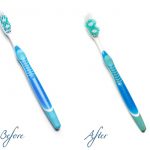How Do You Cut Sugar Cravings?
According to the American Heart Association, the average American adult consumes 22 teaspoons of added sugar per day, which is almost four times the recommendation of 6 teaspoons per day for women (9 for men).
By the way, this isn’t specific to the sugar consumed over the holiday season! This is on an average daily basis. Yikes!
Now, think back to all those holiday cookies or peppermint flavored coffees you’ve had over the last two months. You can easily double your typical daily sugar consumption without even realizing it at the rate we eat in November and December.
As we head into a new year—and decade—with our sincerest resolutions to eat healthy and limit sweets, many still struggle with letting go of sugar. And yes, sugar specifically—this seems far harder than letting go of other craving. From those patients who choose to go cold turkey all the way to those who try to avoid treats or only eat them on certain days of the week, the truth of the matter is that most people will fail and, inevitably, binge on the exact foods they were trying to avoid.
For all our patients in Fort Worth who are trying to limit their sugar intake, Dr. Ku is offering some manageable tips as well as background on why ditching sugar can be so difficult. (Understanding the “why” makes it easier to get past.)
Why is sugar such a hard habit to kick?
Sugar is aptly compared to a drug, because it actually activates the same pleasure center in your brain and gives you a euphoric, temporary energy and high by producing dopamine. Like a drug, you crave even more sugar the more you eat or drink it since you build up a tolerance. This makes you need more to get the same effect.
What does too much sugar do to the body?
Sugar has been shown to impact more than just your waistline and teeth (don’t be surprised your dentist mentions the impact of sugar on your chompers). From your joints to you skin and even your organs (especially your heart, liver, kidneys and pancreas), sugar effects all our internal systems.
When you eat excess sugar, the extra insulin in your bloodstream can affect the arteries all over your body. It causes their walls to grow inflamed, becoming thicker and stiffer than normal, which stresses your heart and damages it over time. This can lead to heart failure, heart attacks and strokes. In addition, if you have joint pain, here’s more reason to lay off the candy: eating lots of sweets has been shown to worsen joint pain because of the inflammation it causes in the body. Plus, studies show that sugar consumption can increase your risk of developing rheumatoid arthritis if you don’t already suffer from it.
With all these complications, it’s easy to see why kicking the sugar habit is necessary. It doesn’t, however, make it any easier.
How to curb sugar intake…
1. Take it slow
Maybe you feel motivated on Day 1 to jump right in and eliminate all added sugars from your diet. It’s important, however, to take the change gradually. Start by removing the most obvious sources of sugar in your diet like soda, cakes and cookies, and candy. Once you do that, move on products like sugar in your coffee creamer or juices with added sugar.
2. Read labels
If you are able to successfully remove all obvious forms of sugar, it’s important to start reading labels to ensure you aren’t accidentally consuming high amounts of added sugar. Did you know, for example, that common household staples such as ketchup and “healthy” cereals and granola bars are loaded with extra sugar?
Sugar has many names and is in many different syrups and concentrates you should be on the lookout for, too. There are at least 61 different names for sugar on food labels. These include common names (such as sucrose and high-fructose corn syrup), as well as barley malt, dextrose, maltose and rice syrup, among others.
While product labels list total sugar content, manufacturers are not required to say whether that total includes added sugar, which makes it difficult to know how much of the total comes from added sugar and how much is naturally occurring in ingredients such as fruit or milk.
3. Limit simple carbohydrates
Carbohydrates are always a hotly debated issue when it comes to losing weight and getting healthy. As we’ve discussed when it comes to oral health, the body quickly breaks down simple carbohydrates in foods into sugar. This process causes a spike in blood sugar levels thereafter.
Simple carbohydrates include foods like white pasta, white rice and white bread. If you can’t fathom living without bread or pasta, make sure you consume those that are made of whole grains. These foods keep the blood sugar levels steady and prevent the urge to binge on other sugar-filled foods later.
4. Watch what you drink
While you’re carefully watching what you eating, you might forget to keep as strict of a watch on what you drinking. Avoiding sugar in drinks is just as challenging as avoiding it in food. Maybe you’re thinking that you know already that juices and the coffee drinks that are more milkshake than joe won’t help you curb your sugar habit, but even diet sodas and low–sugar choices can sabotage your goals. Replacing these drinks with unsweetened herbal tea, coffee without sugar, sparkling mineral water, or just water can help a person stay hydrated without increasing their sugar intake.
5. Avoid artificial sweeteners
It might seem like an obvious substitution to use an artificial sweetener in your daily cup of coffee, but consuming the artificial sugars can actually cause more harm than good. Eating artificial sugars can trick the body into thinking you’ve consumed sugar. This can intensify a person’s sugar cravings, making it more difficult for them to stick to a no-sugar diet. Try to stay away from products that contain ingredients like aspartame, sucralose, saccharin or neotame.
6. Give in a little
If there is anything that we believe in at Dr. Ku’s office, it’s moderation. Enjoying a little of what you love can help you steer clear of feeling denied or overdoing it on another occasion. Another option we support is reaching for that sugar-free gum. Chewing gum can take your mind off the need for a treat. In addition, it can boost oral health! We’ll call that a dental double win.
Cutting back on your sugar intake can be great for your overall health. If this is one of your goals for 2020, then remember to take it slow and don’t think that you’ve failed the first time you slip up!






